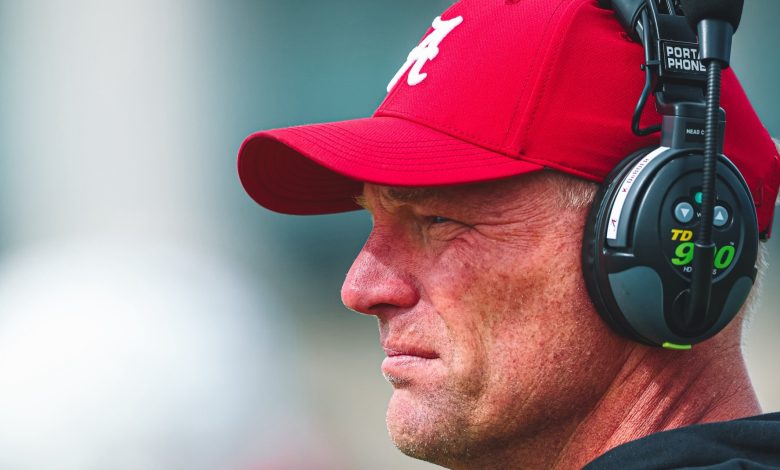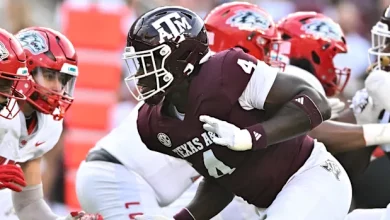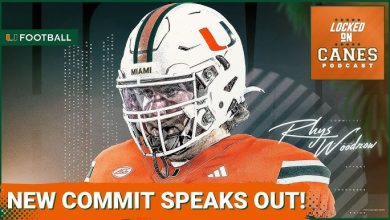“The grass is definitely not greener,” Kalen DeBoer told Alabama football players before the spring transfer portal window.

The landscape of college football has undergone significant changes in recent years, with the introduction of the transfer portal providing players with more freedom to move between programs. While the transfer portal offers opportunities for student-athletes to find better fits for their playing time or personal situations, it has also led to concerns about the instability and potential for player movement to become a regular occurrence. One prominent figure, Kalen DeBoer, the head coach of the University of Alabama football team, recently addressed his players with a clear and powerful message before the spring transfer portal window opened: “The grass is definitely not greener.”
This statement reflects a broader, underlying philosophy of DeBoer’s approach to team-building, loyalty, and development. As the football world continues to evolve and players seek out opportunities for more playing time or perhaps more favorable circumstances, DeBoer’s cautionary words seem particularly pertinent. His message not only speaks to the pitfalls of transfer decisions but also emphasizes the values that have underpinned Alabama’s success over the years. In this article, we’ll explore the implications of DeBoer’s words, the challenges players face when considering transfers, and how his leadership is shaping the culture of Alabama football.
The Rise of the Transfer Portal
Since its implementation in 2018, the NCAA Transfer Portal has drastically altered the way college football programs operate. The portal allows athletes to enter their name into an online database, signaling to other programs that they are available to transfer. Once a player enters the portal, they can begin speaking with other teams and make decisions about whether to remain at their current school or move to a different program. This move has been largely seen as a positive change in the college sports landscape, as it offers players more autonomy and the opportunity to pursue new opportunities if they feel their current situation isn’t the right fit.
However, the portal has also led to an increase in player movement, with some programs experiencing significant turnover year after year. The perception that the grass may be greener elsewhere has become a driving force behind many of these decisions. Players seeking more playing time, a different offensive or defensive system, or perhaps simply a change of scenery are increasingly willing to leave programs in search of what they believe will be a better situation. In this environment, the role of the head coach has become even more critical, as leaders like Kalen DeBoer have to balance the needs and desires of individual players while also maintaining the cohesion and success of the team as a whole.
Kalen DeBoer’s Message: “The Grass is Definitely Not Greener”
As the transfer portal window opened in the spring of 2025, Kalen DeBoer took the opportunity to remind his players of the importance of long-term development, loyalty, and commitment to the team. “The grass is definitely not greener,” he told his players, emphasizing that the decision to leave Alabama should not be made lightly. DeBoer’s message resonated with many players, particularly those who were considering entering the transfer portal in search of more immediate playing time or a different situation.
DeBoer’s statement highlights several key points about player movement and the potential consequences of transferring. At its core, it suggests that players may be chasing an idealized version of success, one that may not materialize once they leave the familiarity and structure of their current program. In other words, the notion that transferring will automatically lead to a better situation is often more of an illusion than a reality.
1. The Reality of Player Development
One of the most important aspects of DeBoer’s message is the importance of patience and player development. Alabama football, under Nick Saban’s leadership, has been built on the philosophy of hard work, discipline, and gradual improvement. Players who come to Alabama know that they may not be starting right away, but they will have the opportunity to learn from some of the best coaches in the country, develop their skills, and grow into elite athletes. This long-term approach to player development has been a hallmark of Alabama’s success over the years.
DeBoer’s words serve as a reminder to players that success in college football is often earned through perseverance and dedication rather than immediate gratification. He is encouraging his players to trust the process and to recognize that transferring to another program may not guarantee the immediate success they are seeking. Rather than jumping to another team in search of a quicker path to playing time, players should focus on improving their skills, competing for their spot, and contributing to the team’s success in the long run.
2. The Uncertainty of Transfers
Another critical element of DeBoer’s message revolves around the inherent uncertainty of transferring. While the transfer portal may seem like an escape from a challenging situation, it does not guarantee a better opportunity. Players who transfer may encounter new challenges, such as adjusting to a different system, learning new playbooks, or competing with a new set of teammates for playing time. The grass may not always be greener on the other side—what looks like an ideal situation on paper may not necessarily translate into the success the player anticipates.
In some cases, players may transfer to programs that are struggling or in a rebuilding phase, which could result in a less-than-ideal football experience. The uncertainty of the transfer portal is a reality that many players fail to account for when making their decisions. DeBoer’s cautionary statement encourages players to weigh the potential risks and drawbacks of transferring, rather than simply chasing a perceived better situation without fully understanding the consequences.
3. Team Cohesion and Stability
DeBoer’s message also underscores the importance of team cohesion and stability. In a time when college football programs are experiencing high levels of turnover due to the transfer portal, maintaining continuity and chemistry within the team is more important than ever. Alabama’s success has been built on a strong sense of unity, discipline, and mutual respect among its players and coaches. By encouraging players to stay committed to the program and to each other, DeBoer is reinforcing the idea that team success depends on the collective effort of all individuals, not just the performance of a few star players.
When players enter the transfer portal, it can disrupt the balance of the team, potentially creating an environment of uncertainty and competition that undermines the collective goals of the program. By promoting the idea that loyalty and commitment to the team are more valuable than individual success, DeBoer is emphasizing the importance of a stable, cohesive environment that fosters success both on and off the field.
4. The Impact of Immediate Gratification
The transfer portal is often associated with the desire for immediate playing time and instant gratification. For many players, the allure of playing sooner rather than later can be irresistible. However, DeBoer’s message highlights the importance of taking the time to develop into the best player possible, rather than rushing to find immediate satisfaction. College football, especially at a high-level program like Alabama, is competitive, and players must understand that patience is a necessary part of the process.
The emphasis on long-term development also speaks to the mental toughness that is required to succeed in college football. DeBoer’s statement encourages players to embrace challenges, work through adversity, and trust that the rewards will come in time. In doing so, he is promoting a mindset that focuses on growth rather than immediate success, which is essential for developing well-rounded players who can thrive in the demanding world of college football.
DeBoer’s Leadership and Alabama’s Future
Kalen DeBoer’s leadership at Alabama is built on a foundation of trust, respect, and long-term vision. His message before the spring transfer portal window is indicative of his commitment to maintaining the integrity of the program while also fostering an environment of growth and development for his players. As the landscape of college football continues to evolve, DeBoer’s philosophy of stability, loyalty, and patience stands in stark contrast to the growing trend of player movement through the transfer portal.
In a world where transfers have become increasingly common, DeBoer’s words serve as a reminder that success is not guaranteed by jumping to another program, but rather by putting in the hard work, committing to the team, and trusting the process. For Alabama football, DeBoer’s leadership provides a steady hand in a time of change, and his message resonates deeply with players who are seeking not just a place to play, but a place to grow and succeed as part of a larger team effort.
As the spring transfer portal window closes and the season progresses, it will be interesting to see how DeBoer’s philosophy impacts the decisions of Alabama’s players. His belief that “the grass is definitely not greener” serves as a crucial reminder that true success in college football—and in life—is found through dedication, perseverance, and a commitment to the team, not by chasing short-term solutions.









